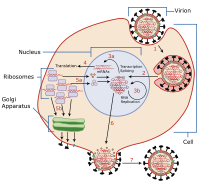
Photo from wikipedia
Dengue virus (DENV) is a mosquito‐borne flavivirus that causes frequent outbreaks in tropical countries. Due to the four different serotypes and ever‐mutating RNA genome, it is challenging to develop efficient… Click to show full abstract
Dengue virus (DENV) is a mosquito‐borne flavivirus that causes frequent outbreaks in tropical countries. Due to the four different serotypes and ever‐mutating RNA genome, it is challenging to develop efficient therapeutics. Early diagnosis is crucial to prevent the severe form of dengue, leading to mortality. In the past decade, rapid advancement in the high throughput sequencing technologies has shed light on the crucial regulating role of non‐coding RNAs (ncRNAs), also known as the “dark matter” of the genome, in various pathological processes. In addition to the human host ncRNAs like microRNAs and circular RNAs, DENV also produces ncRNAs such as subgenomic flaviviral RNAs that can modulate the virus life cycle and regulate disease outcomes. This review outlines the advances in understanding the interplay between the human host and DENV ncRNAs, their regulation of the innate immune system of the host, and the prospects of the ncRNAs in clinical applications such as dengue diagnosis and promising therapeutics.
Journal Title: Reviews in Medical Virology
Year Published: 2022
Link to full text (if available)
Share on Social Media: Sign Up to like & get
recommendations!